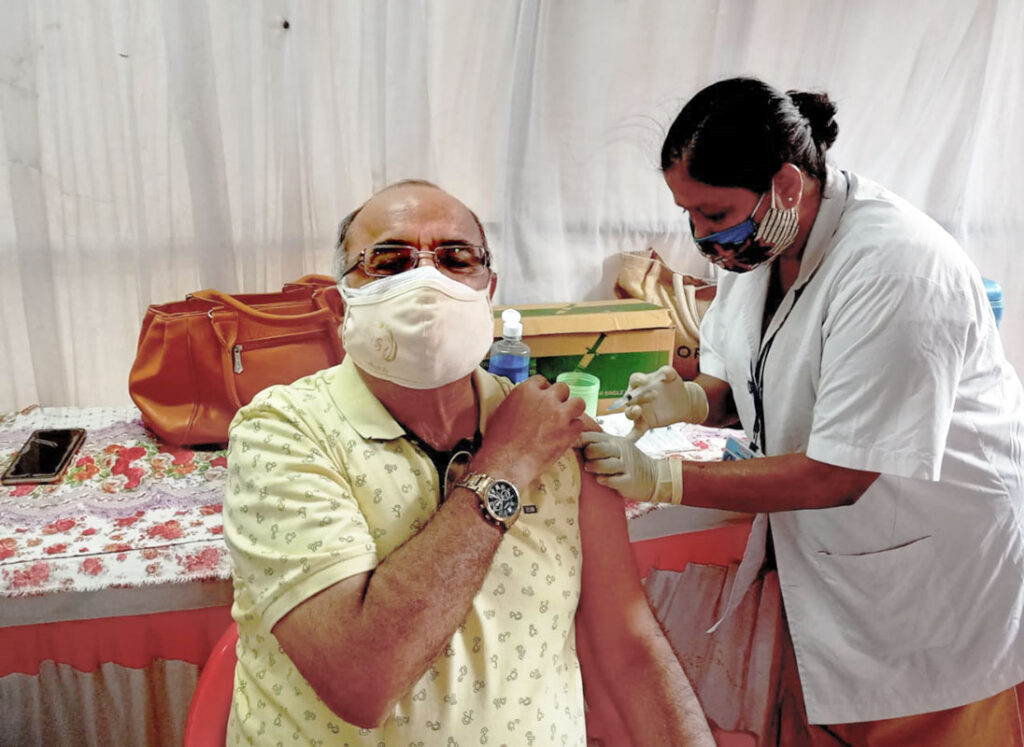On April 21, 24 Covid patients died in a hospital in Nashik, Maharashtra, when their oxygen supply was disrupted thanks to leakage from an oxygen tanker. Even before this incident, a group of Rotarians from several Rotary clubs in Jalna, engaged in Covid prevention and relief work, were looking at ways to maintain and repair piped oxygen supply in hospitals.

These included members from Rotary clubs of Jalna, Jalna Central, Jalna Rainbow, Jalna Midtown and Ambad. Even before this tragedy, as the second wave of Covid surge was coming on, in an online meeting of the Maharashtra government chaired by chief minister Uddhav Thackeray, with district collectors and hospital representatives, Dr Hitesh Raithatha, a Rotarian from Jalna and a club director of Rotary’s Covid Task Force (RID 3132), who owns a hospital in the city, gave a valuable input. He suggested that all hospitals should make sure that their oxygen pipelines are performing optimally and without leakage. “The CM liked his suggestion and the district commissioner suggested that Rotarians take this up as a pilot project,” says Govindram Mantri, assistant governor and regional coordinator of the Rotary Covid Task Force, RID 3132.
Normally to repair a leaking oxygen pipe you have to suspend the supply and cut the pipeline. But at this critical juncture, we use machines which allow plugging the leakage without stopping or disrupting oxygen supply.
The task force in Jalna swung into action and undertook a crucial and timely exercise to ensure proper maintenance of oxygen pipelines at the Government District Hospital, Government Women’s Hospital, the Jalna Mission Hospital and four other private hospitals. “We knew that doctors and hospital administrators, already under so much pressure, have no time to do this, so we undertook this responsibility.” Ultrasonic machines were used to detect leakage.
He explains that the cost involved in plugging the leakage of oxygen from piped supply is merely ₹3,000–4,000 per hospital. “Normally to repair a leaking oxygen pipe you have to suspend the supply and cut the pipeline. But at this critical juncture, when people are dying for lack of oxygen, this is not possible. So we use machines which allow plugging the leakage without stopping or disrupting oxygen supply.”
He adds that by this simple initiative at least 20 to 30 per cent of this life-saving substance can be saved.
This team of Rotarians also came together to set up a helpdesk for Covid vaccination at five places in Jalna, along with 10 selfie points. Working diligently at 17 vaccination centres, the Rotarians distributed over 12,800 stickers for those vaccinated. Reacting speedily to the second wave causing acute shortage of oxygen, the Rotarians have given 18 oxygen concentrator machines to needy patients free of cost. Once the patient is better, the concentrator is given to somebody else, and totally 121 patients have benefited. District 3132 funds helped to buy five of these.

They also undertook the responsibility of keeping the vaccination centres clean and hygienic, and provided chairs for the people coming for vaccination, apart from distributing masks, sanitisers and ensuring social distancing.
Realising the crucial need for vaccination, particularly in those areas with lower levels of literacy and awareness, the Rotarians did public announcement through hired rickshaws in slum areas and by organising roadside meetings. “This was done to remove any fear of vaccination,” said Mantri. Hoardings shaped like masks were also put up at vantage points carrying messages about the benefits of taking a Covid vaccine.
Apart from awareness, there was concrete action too — mega vaccination centres were set up at the Roopam Hall and Karwa Hospital, and these provided free vaccination, covering till April-end, over 2,700 people. “Covid-immune passports will be issued to all Rotarians who have completed both the doses of the vaccine,” he added.
A former member of RC Jalna, Rajendra Barwale, now a member of RC Bombay Midtown, RID 3141, who is an industrialist, had put up an oxygen plant in Jalna at a cost of ₹2 crore. This was inaugurated by Maharashtra health minister Rajesh Tope “who is from Jalna. This is one of the reasons we all know him well and get good cooperation and speedy response from the government for doing community service projects,” says Raithatha.
Mantri adds that all these initiatives were undertaken by the collective club leadership, and relentless work put in by Rotarians such as Dr Raithatha, Dr Rajiv Jethaliya, Dr Ravindra Bedarkar, Dr Pratik Lahoti and Dr Rohit Bhala. As for the money required for this work, he smiles: “Oh, there are many good people in Jalna and there is no dearth of donors for worthy service projects.”






